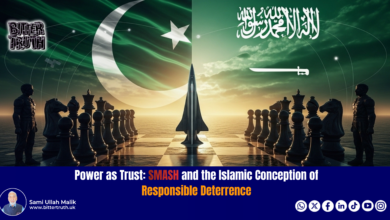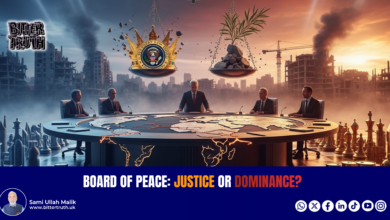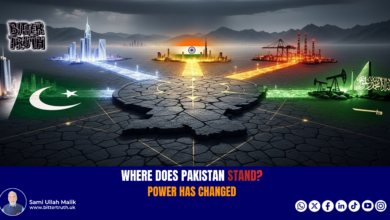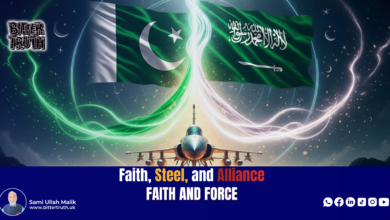Trump’s Peace Plan and Saudi Response
The Palestinian Issue: The Future of the Two-State Solution
Donald Trump’s Return to the White House: Challenges and the Middle East Peace Plan
On 20th January 2025, Donald Trump is set to begin his second presidential term, making a return to the White House. His anticipated cabinet nominations have already sparked discussions about his ability to fulfil his campaign promises. Trump’s remarks during the recent Israeli-Palestinian conflict hinted at his forthcoming policy priorities, particularly a renewed focus on peace in the Middle East—an initiative largely sidelined during his first term.
This second term begins amidst a prolonged conflict in Gaza that has spanned over a year and at a time when the global political landscape, including that of the United States, has shifted significantly compared to four years ago. These circumstances have heightened concerns that Trump’s ambitious Middle East plan, famously dubbed the “Deal of the Century”, may be aggressively pursued with unwavering support for Israel and even the use of force. This plan was once described by Trump as the Palestinians’ “last opportunity.”
Palestinians have expressed increasing unease, viewing the plan as a stark violation of international law and their rights—particularly regarding borders, refugees, and Jerusalem. The plan, according to critics, aims to erase Palestinian identity in the region and replace it with constructions such as the Third Temple on the Al-Aqsa site, posing a severe challenge to the Islamic world.
Israeli Prime Minister Benjamin Netanyahu described the plan as “the opportunity of the century,” vowing not to let it slip away. Analysts widely expect Trump to reintroduce the Middle East peace initiative during his next term, albeit in a potentially modified form.
The “Deal of the Century”: A Controversial Blueprint
Unveiled on 28th January 2020, Trump’s Middle East peace plan outlined several contentious elements. It proposed the creation of a demilitarized Palestinian state, while sanctioning the annexation of West Bank settlements and the Jordan Valley by Israel. The plan also dismissed the right of return for Palestinian refugees.
Under the proposal, Palestinians would only be granted a fragmented state, far from the pre-1967 borders and without territorial continuity. Furthermore, the plan declared Jerusalem as Israel’s “undivided capital,” leaving Palestinians with potential administrative claims in areas like Abu Dis or Kufr Aqab, rather than in East Jerusalem itself.
Other provisions included maintaining the status quo of Al-Aqsa Mosque while assigning Israel security control over the Jordan Valley and the proposed Palestinian territories. Refugees were offered limited options: resettlement in the new Palestinian state, integration into host countries, or distribution across willing members of the Organisation of Islamic Cooperation.
A Potential Return of the Plan
Experts argue that Trump’s new term might see a reintroduction of the plan in a revised form. Israeli affairs researcher Nazeer Majali suggests that the plan could be reshaped to reflect the current geopolitical realities. The Middle East Institute in Washington anticipates the revival of a “Deal of the Century 2.0,” likely focused on diminishing Palestinian political rights while offering economic incentives as compensation.
British analysts highlight that the original plan is now “unfeasible,” requiring substantial updates to align with today’s ground realities. They predict that any new proposal might pressure the Palestinians into accepting a diluted two-state solution, shaped more by Israel’s interests and U.S. backing than by international law.
Challenges Ahead
Trump’s approach, heavily influenced by his belief in deal-making and his pro-Israel advisors, suggests that any new initiative may continue to marginalize Palestinian interests. The deal’s acceptance by Palestinian, Arab, and Islamic stakeholders remains highly unlikely, given its implications for regional and global peace.
The fragile state of the Middle East, exacerbated by recent conflicts, will serve as the foundation for any new proposal. While Trump might present a fresh peace plan that ostensibly aims for a two-state solution, its practicality remains uncertain. Israel’s continued actions, supported by the U.S. and its allies, raise significant doubts about the feasibility of any equitable resolution.
In conclusion, Trump’s second term may reignite debates about Middle East peace, but the road ahead is fraught with deep-seated tensions, entrenched political positions, and an evolving international landscape that complicates the pursuit of lasting peace.
The Two-State Solution: A Pragmatic Approach to the Palestine-Israel Conflict
Expert analyst on Israeli affairs, Nazir Majali, believes that the two-state solution remains the most ideal resolution for the Palestine-Israel conflict. He states, “The two-state solution is still a realistic and viable approach, even though the current Israeli government is not peace-oriented. This solution has global acceptance and should not be abandoned, as doing so would serve those who advocate for the complete Israeli annexation of the land and deny any rights to the Palestinian people.”
Certainly, Saudi Arabia and other regional nations also endorse the notion that “the two-state solution is still on the table, as it considers everyone’s interests while explicitly upholding the principle of establishing a Palestinian state, which is the most crucial factor for Arab stakeholders.” This framework could form the foundation for renewed Saudi-American negotiations aimed at normalising relations with Israel and granting it recognition.
Given the current circumstances in the region, the two-state solution remains the only option acceptable to Arab nations, particularly Saudi Arabia and other neighbouring countries. This solution is supported politically by most Islamic nations. However, on the ground, the concept lacks tangible implementation and seems increasingly unlikely to materialise in the future. As such, it appears to be moving towards dissolution in its proposed form.
During his presidency, Donald Trump might propose a new plan that disregards the internationally accepted two-state solution, aligning instead with the region’s evolving geopolitical realities. Such a plan could aim to reinforce American dominance by further empowering Israel as the regional hegemon. Israel has already used the Gaza conflict as a pretext to redefine its security boundaries, extending from Gaza to the occupied West Bank, Lebanon, the Golan Heights, and even the Jordanian border.
Israel’s Strategic Agenda
Israel seeks to reshape its geography based on a security-driven ideology, thereby diminishing the prospect of a Palestinian state or any concept of peaceful coexistence between two states. This approach could increase pressure on the Trump administration to propose a practical resolution to territorial disputes.
There is a strong likelihood that Trump’s plan might include annexation of large parts of the West Bank under Israeli control. Israel could leverage this annexation to redefine its borders, consolidate territories, expand its boundaries, and create new buffer zones under the guise of security. Evidence of such intentions can be seen in Trump’s choice of Mike Huckabee, former Governor of Arkansas, as the next U.S. Ambassador to Israel. Huckabee, in 2017, stated:
“There is no such thing as the West Bank; it is Judea and Samaria. There is no concept of Israeli settlements; these are communities, neighbourhoods, and towns. There is no occupation.”
Israel may also advocate for continued annexation of the West Bank while maintaining control over the areas with significant Palestinian populations, where full sovereignty cannot be declared. This intention is supported by recent developments, such as Israeli Minister Bezalel Smotrich instructing his ministry to prepare for imposing full Israeli sovereignty over settlements in the West Bank.
Saudi Arabia’s Role and Perspective
On the other hand, Saudi Arabia views the restoration of diplomatic and political relations with Israel as more than just a bilateral issue. It perceives this normalisation as a bridge between the Islamic world and Judaism, carrying not just political but also religious significance. For this reason, Saudi Arabia remains firmly committed to the two-state solution. Crown Prince Mohammed bin Salman reinforced this position during his address at the Islamic Conference in Riyadh, sending a clear message to the U.S. and its Western allies.
The Crown Prince acknowledges that normalising Saudi-Israeli relations would benefit the U.S. and Israel more than Riyadh itself, as it would legitimise Israel not only in the Arab world but also within the Islamic community—a substantial concession for Saudi Arabia. Consequently, Israel must fulfil its responsibility for peace by recognising a Palestinian state with East Jerusalem as its capital.
Speaking on this issue, Nazir Majali highlights:
“Despite the possibility that Palestinians may never accept Arab countries normalising ties with Israel, the perspective on this issue must evolve. Nations with relations with Israel are independent states with their own interests, and Palestinians should refrain from interfering. If these nations perceive relations with Israel to be in their interests, it is their internal matter. If Palestinians believe these ties undermine their national rights, they should diplomatically engage with these nations to draw attention to their concerns.”
Leveraging Diplomatic Relations
Majali suggests that Islamic nations could leverage their diplomatic ties with Israel to advance Palestinian interests. By advocating for the liberation of Palestine from Israeli occupation and establishing a Palestinian state, these nations could use their influence to support the Palestinian cause.
The proposed plan under discussion envisions a comprehensive peace agreement between Israel and Arab states, facilitating the establishment of a Palestinian state as part of this broader arrangement. Majali emphasises the need to focus on such initiatives, which balance regional aspirations with global diplomatic realities.
It is worth noting that earlier this month, Saudi Foreign Minister Prince Faisal bin Farhan reiterated that the establishment of a Palestinian state remains a condition for normalizing diplomatic relations with Israel. Saudi Arabia had previously stated, even before the U.S. elections, that the two-state solution is the starting point for any restoration of ties, rather than making diplomatic relations contingent upon the establishment of a Palestinian state. Saudi Arabia recognizes that the balance of power is not in its favour, which is why, like other Arab and Islamic nations, it has adopted a principled stance. However, in reality, it is not currently willing to use these cards during the ongoing war in Gaza.
Regarding Trump’s potential future peace plan, concerns persist from Jordan and Egypt about the possible implications or roles they might have to play, particularly regarding the prospect of relocating Palestinians to these countries. The official U.S. position still reflects Cairo and Amman’s insistence on avoiding solutions that would effectively push Palestinians towards these nations. The policy of maintaining the “status quo” is evident, as all parties oppose the Gaza conflict, the closure of the Rafah border, and Israel’s control over the northern areas of the West Bank.
In the coming years, leaders will consider practical solutions to the Palestinian issue, taking into account the realities on the ground and evolving geopolitical circumstances, with Israel likely presenting its own proposals. When the “Deal of the Century” was first introduced, Jordan’s Foreign Minister Ayman Safadi warned of the dangerous consequences of any unilateral Israeli actions and stressed adherence to a two-state solution based on the 1967 borders. Similarly, Egypt’s Foreign Ministry emphasized the importance of resolving the Palestinian issue in line with international law and the decisions of the international community.
Meanwhile, there is a growing perspective among pro-Israel think tanks in the U.S. urging Arab nations to fulfill their humanitarian responsibilities toward Palestinians. However, regional countries are increasingly aware of the pressures they may face during this phase. In response to such pressures, Saudi Crown Prince Mohammed bin Salman delivered a clear message to the U.S., its allies, and Israel during the Islamic Conference in Riyadh. The message underscored not just Saudi concerns over Iranian influence but also sought to highlight the threat posed by Israel to the region. This was a strategic declaration of Saudi Arabia’s future course of action.
The U.S. and Western Europe also interpret Saudi Arabia’s unexpected announcements as a success of China’s quiet diplomacy. This approach appears to be aimed at diminishing U.S. influence in the region, marking a shift that some describe as burying the legacy of American dominance. The question remains: will the U.S. continue using Israel as a sacrificial pawn to safeguard its own interests, or will Israel appeal to its allies within the U.S. for assistance? If the latter happens, Trump’s return to the White House could prove to be a short-lived affair.






